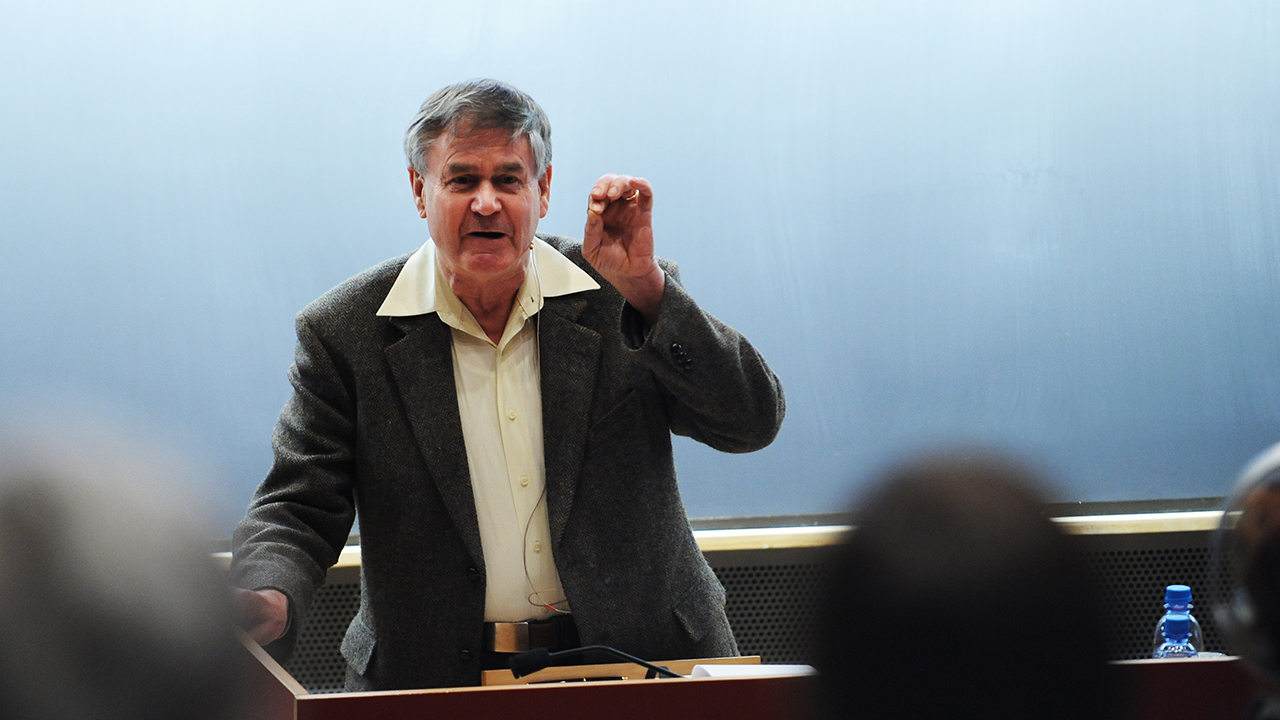In Memoriam: 2009 Holberg Laureate Ian Hacking

We are saddened by the passing of 2009 Holberg Laureate Ian Hacking on 10 May 2023.
Having in his long academic career straddled both sides of the Atlantic, and having investigated and written about a great number of phenomena, historical, natural as well as contemporary, Ian Hacking remains one of the foremost philosophers of science in the postwar era. Hacking’s work on chance, probability, madness, travels and molecules—to single out only a sample of the many fields to which he has contributed—has deeply influenced not only the domain of philosophy, understood broadly, but has also moulded discourses in fields such as history, science and technology studies, sociology, anthropology, law and the medical and natural sciences.
In a ceremony on 25 November, 2009, in Bergen, Ian Hacking was conferred the Holberg Prize. During the Holberg Symposium on the previous day, he delivered his Holberg Lecture entitled “The Social Construction of What?”.
The Holberg Committee’s recommendation for awarding Ian Hacking the 2009 Holberg Prize is reproduced here in extenso:
“Ian Hacking is a preeminent philosopher and historian of the sciences. His combination of rigorous philosophical and historical analysis has profoundly altered our understanding of the ways in which key concepts emerge through scientific practices and in specific social and institutional contexts. His work lays bare the normative and social implications of the natural and the social sciences.
In The Logic of Statistical Inference (1965), Hacking critically appraises the use of probability theory in contemporary statistics. The Emergence of Probability (1975) makes clear how the idea of probability first took shape in the seventeenth century, in the work of thinkers such as Blaise Pascal and Pierre de Fermat. He pursues the story into the nineteenth century in The Taming of Chance (1990), where he shows how the "avalanche of printed numbers" that occurred as states began to collect and publish statistics, led scientists to use probabilistic concepts to understand social life. No scholar has made a more substantial contribution to our comprehension of the emergence of probability as a fundamental concept in both theory and practice in the modern world.
Hacking’s archival explorations of the nineteenth-century explosion of numerical data raised a second important set of questions. In order to handle the flood of numbers, scholars developed new ways of classifying human beings, constructing new "kinds of people". Hacking argues that this "kind-making" shaped the ways in which people assigned to scientific and administrative categories think and act. This line of work resulted in a series of major studies, including Rewriting the Soul: Multiple Personality and the Sciences of Memory (1995) and Mad Travelers: Reflections on the Reality of Transient Mental Illnesses (1998).
Throughout his career Hacking has addressed the central philosophical question of scientific realism: whether the theoretical entities postulated by the sciences—from "electron" to "multiple personality disorder"—are real in the same way as everyday objects. This issue is at the heart of his thinking about human kinds. In Representing and Intervening (1983) he argues that to decide whether concepts in the physical sciences should be understood realistically we must see how they are used to intervene in the world through experiments. The Social Construction of What? (1999) brought his interest in realism about natural kinds together with his work on human kinds, radically redefining the issues at stake in the controversies about "social construction." His recent work ranges across topics such as obesity, race, and autism, as he continues to address the problem of human kinds.
Ian Hacking’s work reverberates throughout the humanities and social sciences, reframing our understanding of the interactions between the natural and the social worlds.”
Following the reception of the 2009 Holberg Prize, Ian Hacking continued his work in the field of philosophy of science, focusing on mathematics and, particularly, the question of why there is or rather, why there should be a philosophy of mathematics. This line of inquiry and scholarship led to his last book, Why is There Philosophy of Mathematics at All?, a book published in 2014 to critical acclaim and generating interest in a number of fields, as has Hacking’s previous works. Influenced also by Wittgenstein’s work and being a book about a philosophy of mathematics and not a book in the philosophy of mathematics, the work exposes the attraction of mathematics both for its centrality of proof and its real-world applicability—a work thereby speaking to two key themes that has characterized his oeuvre for decades.
Until his passing, Ian Hacking has been described as being led from phenomenon to inquiry by a keen sense of unbridled intellectual curiosity, displaying rigor and consistency as a truly independent scholar. His original works remain a lasting inspiration for new generations of scholars within not only philosophy of science but research and thought more broadly.
Relevant links
Citation of the Holberg Committee.
Interview with Ian Hacking
Recording of Ian Hacking’s 2009 Holberg Prize Acceptance Speech.
Ian Hacking's 2009 Holberg Lecture: The Social Construction of What?